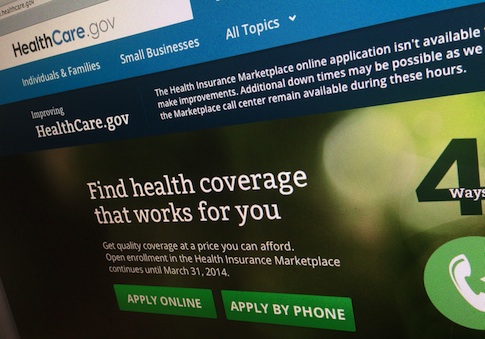As enrollment in Obamacare’s federal health insurance exchange reopens, congressional Republicans are again raising conflict of interest questions in light of a shake-up among top executives at a major Obamacare contractor that they say could give one insurer an unfair advantage.
At issue is a major contract awarded over the summer to Quality Software Services Inc. (QSSI). The Department of Health and Human Services brought on QSSI to mitigate a disastrous rollout of Healthcare.gov, the website for online enrollment in Obamacare’s federally run exchanges.
QSSI is owned by OptumInsight, a subsidiary of healthcare conglomerate UnitedHealth Group, which also owns an insurance company, UnitedHealthcare, that will offer more than 7,000 insurance plans through Healthcare.gov in 15 federally run exchanges next year.
That presents a potential conflict of interest, according to Sens. Orrin Hatch (R., Utah) and Chuck Grassley (R., Iowa).
"Optum/QSSI will have access to a significant amount of data regarding highly sensitive aspects of FFE operations, including payment calculation for reinsurance, risk adjustment and risk corridors, and the required data collection to support these services," the senators said in a letter to Marilyn Tavenner, the head of HHS’ Center for Medicare and Medicaid Services, which administers Healthcare.gov.
Other members of Congress expressed similar concerns. Rep. Morgan Griffith (R., Va.) pressed CMS deputy administrator Andy Slavitt, a former Optum executive, on the question of a potential conflict.
Slavitt assured him that there is a proverbial firewall between Optum’s contracting duties and UnitedHealthcare’s role as an insurer competing for business through federally run exchanges.
"Nobody on the Healthcare.gov project is permitted to go back and to go outside of the project and transfer into UnitedHealthcare," Slavitt told Griffith at a July hearing of the House Energy and Commerce Committee.
However, a recent shake-up among UnitedHealth Group executives suggests that may not be the case.
CMS said in September it would extend QSSI’s contract by eight months. It could not re-open the contract for competitive bidding, the agency explained, because online Obamacare enrollment was reopening on Nov. 15 and the timetable was simply too tight.
Three days before the enrollment period began, UnitedHealth Group chief executive Stephen Hemsley announced a host of changes among the company’s top executive leadership. Two senior Optum executives are now party to and in positions to influence the operations of UnitedHealthcare.
Optum CEO Larry Renfro is now also the vice chairman of UnitedHealth Group. "While retaining his responsibilities as CEO of Optum, in his new role Larry will hold a unique senior position, with oversight responsibility for all enterprise strategic relationships, key client relationships, and company-wide growth efforts," Hemsley said.
Dirk McMahon, who led Optum’s pharmaceutical division, "will become executive vice president, chief of enterprise operations for all of UnitedHealth Group, ensuring the operations of UnitedHealth Group, UnitedHealthcare, and Optum are always aligned to serve our clients," Hemsley wrote.
The last line is particularly troublesome, Griffith said in an interview.
"Does that meant they get an advantage because they know information from Healthcare.gov that can share that with their clients? It sounds like to me that that’s exactly what they’re doing," Griffith said.
UnitedHealth Group spokesman Brian Kane said that Optum does not share information with UnitedHealthcare that would provide it with any sort of advantage in the federal Obamacare marketplace.
"Optum’s commitment to protect each client’s proprietary information and confidentiality remains unchanged," Kane said in an emailed statement. "By consistently delivering on that commitment for many years, Optum continues to earn the trust of clients in all segments of the health care industry, including health plans that compete with UnitedHealthcare."
Griffith said he will be following up with CMS officials, "whether that’s in a hearing or through private communication," to address his renewed concerns. CMS did not respond to a request for comment.
"It sure looks like a conflict to me, that’s why I raised the conflict in the first place," he said.
QSSI also received a major contract in 2012 to run a data hub for federal Obamacare exchanges. Under the contract, the Weekly Standard reported, "QSSI would shape, run, and affect companies’ ability to compete to sell insurance through Obamacare’s federal exchanges."
The CMS official who steered the contract to QSSI subsequently left the administration and joined Optum. Months later, Optum bought QSSI.
The purchase "fueled suspicion among industry insiders that UnitedHealth Group may be gaining an advantage for its subsidiary, UnitedHealthcare," the Hill reported at the time.
Griffith says he has not seen solid evidence that UnitedHealth Group is doing so with its current CMS contract. But he says it merits further scrutiny.
"When you put these folks together, you’re basically putting the fox in the henhouse," he said.
